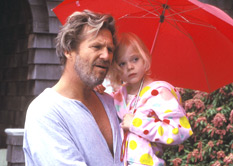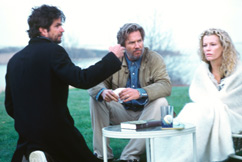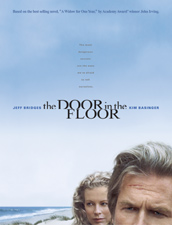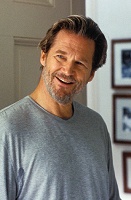|
Jeff Bridges & Kim Basinger
Question: So is this a sequel to Nadine?
Bridges: No, but there ought to be a sequel to Nadine.
Basinger: Yeah, I loved that experience. That was great.
Bridges: That's one of the great things about this biz. It's a pretty small one, so chances are that you link up again with people that you've worked with.
Question: Kim, European cinema is not embarrassed about an older woman and a younger man. American cinema seems to be in many cases. Do you agree? Why do you think that's the case?
Basinger: I don't know, and I don't care. I enjoyed every minute of it. [laughs] I think love and sex and everything comes in all different ways and sizes in life, and I more or less always had a European attitude about things, a looseness. I've been so attracted to the Harold and Maude aspect of living, as opposed to your norm. Normal is so boring. I like to spice it up a little myself.
Question: Were you familiar with John Irving's book beforehand?
Basinger: No. Of course, I knew about it, but no, I was really introduced [to it through] the script, which was really wonderful for Marion. I loved Marion. I loved Marion's—this is the word I'm using—her aloneness, and I loved Kip. I could not and would not have done this piece without Kip. And I don't know, it was just perfect timing for me to meet Marion. She was rather quiet, and got to be somewhat of the voyeur, and that was interesting to me. Everything was very internal.
Question: Jeff, were you familiar with the book?
Bridges: I knew of it. My wife had read it. I read it in preparation for the role. I love John Irving's stuff. He's so great—you know, that marriage of comedy and tragedy that he manages to do is really terrific. And Kip did such a great adaptation of it. That was a big plus for me, when I heard that John was in support of it. I think Kip bought the rights for a buck or something.
Question: How easy was it to get a handle on your character?
Bridges: Well, you know, there were slippery spots, but the place that I first could grab onto the guy was his drawing. I love to draw, so when I saw that in the script, I immediately said, “Oh maybe I can do some drawing here.” That led into it, and of course I have kids. I have daughters of my own, so that was a big handle for me. Then there's some ambiguity in there about his motives, which were fun to play around with. It's funny, I'm a big movie fan, and I find the less I know about a movie going in, the more I enjoy it. So, some of these things—especially the ambiguity of the picture and the role—I find I want to dance around, and not spell out too much. But it was fun to talk about that stuff with Kip. He was so helpful, such a wonderful director.
Question: Did you push for the opportunity to do the artwork in the film?
Bridges: Yeah. I wanted to do the life drawing ones, and as a matter of fact I took some classes in Santa Barbara, but Kip told me, “We need the kid drawings right away,” like about two weeks before the shoot started, so I couldn't get my life drawing chops down enough to do the life drawings. A couple of wonderful artists did those. But it was fun for me to do all the children's [book] illustrations.
Question: You're a photographer, too. Did you take the black and white photos on the wall?
Bridges: No. Those are from Kip's family, and the kids who played our sons were the same kids in those photographs.
Basinger: It's all in the family. He hired everybody out of his family to do something, which was really cool.
Question: Can you talk about getting in the mindset of parents who have lost their children?
Basinger: Well, I think, the advantage you have, having had children— You know what, if I had not had my daughter, I wouldn't know. That's true; that's honest. I don't think you can be as convincing, even to yourself. And as a parent, you just don't go there, so as an artist, when we had to go there, whatever we had, we went there. It's something we didn't even share. We just shared the moment on film. It's so a part of a parent's aura—just, fear.
Bridges: Yeah, exactly. I was thinking about when [my brother] Beau [Bridges] and I did [The Fabulous] Baker Boys. If it was another actor, you'd probably spend a lot of energy trying to figure out, “How do we appear to be brothers? What can we do that will give the illusion,” you know. But since we were actually brothers, we didn't need to talk about it. You had that in your kit bag. You didn't have to take it out; it was just there. And a similar thing with having children yourself, I didn't have to think about, “Oh, my kids—” It was just kind of there, I didn't have to bring it out, even to myself, in the work. But one of the things I did in preparation for that aspect, losing a child, was talk to my mother, who lost a child just before me. The boy was named Gary. My mom and my dad went though Sudden Infant Death Syndrome. Can you imagine? A year old, and you go up to see your baby, and your baby is dead. I talked to her about that, and how they worked through that, and their different styles, and how long it lasted. I mean, still it's just like it happened yesterday. You talk to my mom and she's right there.
Question: This is going to be a very difficult movie for those of us who also review films to explain, without making it sound depressing. There's a kind of exhilaration about this film that sits in paradox with its depressing elements. How did you view that kind of fractured sensibility?
Bridges: Well, that's that John Irving deal. He can do that so well.
Basinger: Death is a piece of the journey, and he can still keep the humor. Death was just the beginning of this journey. That's how life goes, it really does. Some people sink at that piece of the journey, and then they don't go on to find out what will unravel— Am I making sense? A lot of people never get over a death, or don't have a way of coping, and they just sink with the death. Many times you see the strength of people and their journeys thereafter, and I think this is exactly the way Irving writes as well.
Question: Jeff, you talked about were drawing from life experiences to get all those details. It seems that all the characters in the movie are quote/unquote bad people, who manipulate the rest of the characters for their own sake. Did you draw from life experiences to get that part of the role, too?
Bridges: Yeah, there's a sense of that manipulation that I can draw on of my own, you know, how I'm selfish. I'm manipulative. I can see that in myself. I don't have to observe other people, although I do that. I think your point is that's something we all do. We all have that darker side, I think.
Question: We've talked about the word manipulative, and you mentioned the word ambiguity, but the word that struck me was perversity. I see these characters, every one of them, playing a perverse game. Did you see that?
Bridges: Hmm, perversity. When you say that, that's kind of a relative term, I think. What one person might call normal behavior, another person would call perverse. But it's almost out of your control, I think. From my point of view, I think the characters— Maybe if they could choose what kind of people they were, they would pick something else, but they couldn't help their behavior, with the situation of losing these two kids in that terrible way, and how it affected them.
Question: Was it a coping thing?
Bridges: Exactly. And not a thought-out thing. It's just how the body processed it. What do you think, Kim?
Basinger: You know, I just had a thought while you guys [were] talking about it. Jeff is the narrator in this, and I love his voice in the movie—I love it. I loved it when I saw the trailer, and reading the book. But it's so funny because I consider Marion the narrator in another way, because she tells what will happen. It's almost like she's outside the movie, saying, “This is the way it's going to go. Let me tell you: This is what he's going to do. This is what I'm going to do. This is what you will do.” And it happens that way. I don't know about the word “perverse.” Jeff's character is so Jeff-drawn. He does a lot of studying, Jeff does, to get these characters that he plays. I've never seen another actor go through this process like he does for his characters, to where they are truly full. And I don't see that he uses anything other than his creative mind to come up with these things that he comes up with. And I mean it, it's all Jeff. It's all Jeff-driven.
Question: Jeff, I would say this is the first film of the year that could be an Oscar nomination. What do you think about that? Did you have the feeling that this was one of your best performances?
Bridges: I like to hear you say that. It makes me feel good, to have people appreciate your work, and hopefully it will make people go see the film, too. I don't know, I don't really think about [the Oscars]. It's kind of early in the year; it probably wouldn't be very good odds in an Oscar race, if I was a betting guy. But, you know, that also starts with the words that you get to say, and the story that you're telling. And the words are just wonderful.
Basinger: That's very true. They're just phenomenal.
Question: Jeff, what was your character's motivation in instigating the affair?
Bridges: Yeah, well, you know, I don't want to tell you that. I want that to be something you people talk about over coffee. I don't want it locked in print anywhere. But that is a good question. [laughs] That's one I asked.
Question: Kim, what was the motivation of your character in going with Eddie?
Basinger: I watched Harold and Maude too many times. I wanted to upgrade her one. You know what I found in him? I found we were on similar journeys, that's what I found. I found a friend. I found someone that I could let a little of me out, and I wasn't looking for a way to do that really. I just stumbled upon it, and the opportunity was there. And there were a lot of things going on in her mind, too.
Question: Did you two have conversations together about your characters? Did you debate motivations?
Basinger: You know, for me, for the relationship in the movie, we kept it that way [offscreen]. It was a tough place, where Marion was, where Ted was, and there was a lot of silence. So we kept it that way. We didn't really talk. We didn't talk over anybody's next move in the game. It just played itself.
Bridges: One of the interesting things about what we do, from my perspective, is the different styles and approaches to the work. Everybody has a different approach.
Basinger: I'll say! Here it comes!
Bridges: And our approach—which I really love; it's kind of unusual, I can't think of too many other actors who I enjoy working as much in this way with—is that we do very little talking about it, or very little rehearsal. It's all from “action” to “cut,” basically. It was like that with Nadine, and it was like that with this. Going into that, from me being an actor who likes to rehearse and talk a lot, and peel the onion and get down to my thoughts. It's endless. You're never going to get to it. On the day you get your costume on, you're going to get another layer. That's what I'm hoping; that's what I'm going for. So I was kind of frightened at first working with an actor whose approach is completely opposite, who doesn't want to rehearse or talk about it, just wants to do it. But what counts is the finished illusion, and how you get that doesn't really matter too much. I was so happy with what we were doing for Nadine. We worked in Nadine very well. We came across as a fighting married couple in Nadine.
Basinger: I'll put it this way. I love to sit back and watch him peel that onion. [laughs] I'll sit there all day and watch him peel that onion. In the end, it's two totally different ways of working, but it works.
Bridges: One of my favorite moments in the movie, if not my most favorite, is that silent scene that we have, where we're just sitting there looking at each other in the car, when I'm seeing [Marion] off. We didn't talk about it. We didn't say, “When I'm looking at you, I'm really feeling this.” We didn't do any of that. We just brought what we brought to it.
Basinger: There's a lot of dialogue going on, too, in a strange way.
Question: Were you comfortable with the naked scenes?
Bridges: With Kim's naked scenes? [Kim laughs]
Basinger: I was very comfortable with Jeff's naked scenes. [more laughter]
Bridges: There's a lot of nudity in the film, actually.
Basinger: This film is so American. This is truly an American family. It's so American, you know with John Irving, and Jeff and I couldn't look any more American, and Jon Foster, and Elle, but yet it's so European. So loose and so wonderfully flavorful.
Bridges: I was really happy with the way all of that was addressed.
Question: How did you get Jon Foster comfortable with the naked scenes?
Basinger: You know, I could not have chosen a better partner for that. I've been through this many times, and it's not ever easy or fun, and a lot of things are choreographed, and this that and the other. And Jon and I just walked in the room with Kip, and I just said, “Jon, let's just do thing. C'mon.” And it sort of happened in a natural fashion. I don't know, you'll have to ask [Jon] that question. It's just a thing; we just do it. But I'm so fond of [Jon], and so protective of him, which is just the opposite—because usually I've worked with men who—mostly men, let's see—men!—who have been very protective of me. And so here I found myself doing that. It was quite the reverse. And he is such a trooper, and a lovely guy.
Question: What about Elle? She's such an adorable little girl.
Basinger: You know what? I can hardly even talk about her. She is the most perfect definition of a child. She is so sweet and so real and so refreshing. I love her. The funny thing we found out is Jon and me and Elle all live within two miles of each other. We filmed all this back east, but we live so close to each other.
Question: There is a perception, Jeff, that you are working very, very busily. Yet, Kim, somehow, it seems that you're not working as much, that maybe you don't want to work as much. I know that you're the mother of a young daughter, and maybe you're turning a lot of work down, but is that perception correct? Are you not doing as much as you'd like to do, or is it your choice?
Basinger: Well, no, I did three films last year. I had had a back operation early in the year, so I had to over the physical hurdle. That was a real testing time in my life, and I did. But it was a long process. That, and being a single mom, and bringing up your daughter, and all those kind of things. I don't know when I was last on screen, was it 8 Mile? I can't remember myself. And then all of a sudden I just hit this stride. I met Kip, and because of him, and because of Jeff, I did Door in the Floor, and then right after that I did a movie called Cellular that will come out in the fall—it's kind of a popcorn movie—and then I did another one, Elvis Has Left the Building. It's a comedy.
Question: There's been some noise about a possible sequel to The Big Lebowski .
Bridges: C'mon, is that right? Is there really? Oh man, I hope! |
|
Jon Foster
Question: You come into a movie, your first big movie, and you find yourself doing some remarkable things with beautiful Kim Basinger. How did you manage?
Foster: How did I manage? How did you not manage? I mean, it was a really, really, really, really cool experience, the least to say. I just felt really blessed. She's a beautiful, beautiful woman, and not only that but one of the sweetest ladies I've ever met. It was just such a treat.
Question: She said it all came natural.
Foster: It all did come natural. Very natural. It wasn't strained at all. We didn't do a lot of discussing about what to do. It wasn't very mechanical. They didn't map the scene out. We kind of just did it, and it came out really well. Very well.
Question: What have you told your friends?
Foster: I'm a person who doesn't like to brag. So when they see it, we'll see what they say. I kind of like to keep quiet.
Question: Was this your first sex scene on screen?
Foster: Yeah, it was my first anything, besides a kiss. I had one kiss before that. But that was my first sex scene ever.
Question: How old were you when you shot this movie?
Foster: I was eighteen. I'm almost twenty now.
Question: Did you feel like your character? Were you shy?
Foster: Oh yeah, at first I was shy. It's Kim Basinger, you know. But the second you actually start speaking to her, she's just so calming, so relaxing.
Question: Kim said to us that in love scenes she has done before, the men were protective of her, but in this film she was protective of you. Did you feel that way?
Foster: Yeah, absolutely. She was very motherly. She really watched out for me. Even though it might sound sick because— [laughs] Well, it is the theme, but it wasn't sick. She's a very caring woman. And I'm sure she was just looking out for my best interests and hers as well.
Question: You had several sex scenes in the movie. Did you shoot them all together?
Foster: They tried to push them all into a short period of time. It was like, three days' worth. They pushed them all together. It was nice because you got to do all of them in a row.
Question: A lot of directors clear the set as much as they can. Was that the case here?
Foster: Yes. It was a closed set. Still there was a handful of people in there. Could be seven to nine people in there. But it was, like I said, it was fine.
Question: Was the set closed also with Jeff Bridges?
Foster: I think it was. Yes, it was.
Question: So you didn't get to see Bridge Butt?
Foster: [laughs] I did get to see Bridge Butt, because there is a scene where I'm standing there while he's showering [outside in the yard], and he's nude.
Question: Where you familiar with Irving's book?
Foster: I was. I read the section of the book that was adapted. I didn't want to read the rest of it because I didn't want to know what Eddie was like when he was older. I just wanted to focus on the character at that age.
Question: Your character is very impressed by Jeff Bridges' character. I wonder how that played, because I imagine you were impressed by him as an actor.
Foster: Absolutely. I am such a huge fan of The Big Lebowski and The Last Picture Show . I can't even stress— I really did feel like Eddie, because when you're on [set] you learn so much from these actors. I mean, what better actors to work with than Jeff Bridges and Kim Basinger? They're real pros, and really, really good at what they do.
Question: What does this film mean to you as an actor trying to build a career?
Foster: It's a very emotional movie, a whole range of emotions. It's sad; it's lonesome; it's very funny at the same time, almost slapstick near the end. In terms of my career, I was very, very lucky to have my first job this one, because it's hard to be typecast in this kind of a movie. After something like this, you don't really get chosen to do something like this again.
Question: It's not Eurotrip.
Foster: Exactly. It's not Eurotrip.
Question: Can you tell us what your character seemed like to you?
Foster: Eddie grew up sheltered by his family, and he attended a very prestigious prep school, and most likely did not have any friends, let alone a girlfriend. He completely looks up to Jeff Bridges' character Ted Cole. He's just so taken back by being able to work with Ted Cole for the summer. He doesn't really know what his actual job is going to be. Turns out he's not going to help him at all in writing. But he's a very lonely kid, and he has a lot to learn. And he does. He learns a lot throughout this movie.
Question: What was your immediate gut reaction when you were first given the script and read it, and you knew who was going to be in it?
Foster: Before I even got the script, my brother [Ben Foster] told me that it was an incredible script, and told me the baseline of it. Then after I started reading it I found out that Jeff and Kim were attached, and I just [went] for it.
AboutFilm: Obviously it is a very ambiguous film, so it must have been an ambiguous script. What was your own approach in understanding it? At a certain point your character has got Ted Cole figured out. Did you reach a similar point with the script?
Foster: Absolutely. I read the script countless times, and I had to map the script out because my character grows so much throughout the film, like I said before. At the first he's very lonely and immature; he hasn't had many life experiences. Throughout the movie he becomes more and more confident, and at that one point he does stand up to Jeff's character. You really have to map it out, because when they film a movie, they jump from scene to scene each day, so you need to have the right amount of confidence in the scene, so it flows nicely when it's put together.
Question: Did you have any interaction with Irving at all? What was his input?
Foster: He came on set, and he hung around a couple days, and then all of us went to dinner at his home, with his family. He didn't actually have much to say. A lot of it was passed on through Tod Williams. But he seemed to be very pleased with the dailies.
AboutFilm: How much did Tod Williams tell you what he wanted from you and how much did he leave it to you to figure out?
Foster: He did it in a way that he left it up to me, but he still had the right amount of direction. He'd come and say, “Well, previous to this scene, this is what happened. So in this scene you're still feeling this way.” So he gave the right amount of words to make me actually get in the moment before each scene. But he actually left a lot of it up to me, which was really nice.
Question: Your character writes a story in the film, but you wrote your own story also, is that right?
Foster: I did. There is actually a scene when I hand [Jeff] a written story at the beginning of the movie, and at the end he critiques it, and we both agreed on me actually writing a story and giving it to him. So when he's critiquing my story, he's actually critiquing mine. My life story. I wrote about me growing up.
Question: You grew up in Iowa, and you have an older brother, Ben, who is an actor, correct?
Foster: Yep. Four years older than me, and I love him to death. We live together in Hollywood now.
Question: Is he the reason you are an actor?
Foster: Absolutely. If it wasn't for him I would have steered clear of this business. He pushed me.
Question: What's the best advice he gave you?
Foster: To listen. Listen, listen, listen.
Question: Obviously you have an extraordinary relationship with him.
Foster: Yeah, extraordinary. He's definitely my best friend and my mentor. A lot of time my dad was traveling so Ben really raised me.
Question: Originally they offered it to him, and he thought he was too old for the role.
Foster: Yes. And he suggested that they check me out. Originally he was up for it.
Question: So you grew up in a non-show biz family. Can you tell us a bit more about that?
Foster: Well we moved a lot. I didn't just grow up in Iowa. I grew up in a lot of different places. We were all born in Boston—my brother and my dad, and I were all born in Boston, and then eventually we moved to Iowa. My dad and my mom create high-class nightclubs, bowling alleys, and billiard halls—places where women feel safe. And they're all over the country, so they travel back and forth to make sure they're all going smoothly.
Question: Do they own them?
Foster: They do. They create, design, own. Originally they built a chain of forty-some odd throughout the country, and then they left that and started something new, and there will be ten to twelve open in the next couple years.
Question: Have your mom and dad seen the film yet?
Foster: No, they have not.
Question: Oh, that will be awkward.
Foster: Well, what's even more awkward is that my grandmother is going to be there as well. But she told me, she goes, “I was young once, too.” She's an incredible woman, very lively and young. We're all going to see it Sunday.
Question: Did you ever have any career options, or was it always acting? Have you had any other aspirations?
Foster: I amateur boxed for awhile, and I really enjoy fixing muscle cars up. Fireman—I always wanted to be a fireman, but not anymore. I guess I can't do that.
Question: After seeing you in this role, you would never think, “Oh, this actor fixes up muscle cars.” That's surprising. Is it an obsession?
Foster: Yes, it's definitely an obsession.
Question: So what do you drive?
Foster: I have a 1969 Camaro. Just a beautiful, beautiful piece of machinery.
Question: What's next?
Foster: I'm shooting a series called Life as We Know It in Vancouver for ABC. Sean Faris, Chris Lowell, Marguerite Moreau, Kelly Osborne, D.B. Sweeney. It's about three young boys in high school, and their sex lives, and how complicated it can be. My character ends up having an affair with his English Literature teacher. I know, I know—typecast. It's not a trend!
Question: It's a one-hour pilot?
Foster: It's a one hour. It's been picked up. For September, on ABC. It'll be Thursdays at 9.
Question: So when are you back from Vancouver?
Foster: I have to go up there in four weeks, and I'm up there about five months.

Jeff Bridges and Elle Fanning in The Door in the Floor. |

Tod Williams directs Jeff Bridges and Kim Basinger in The Door in the Floor. |
|






